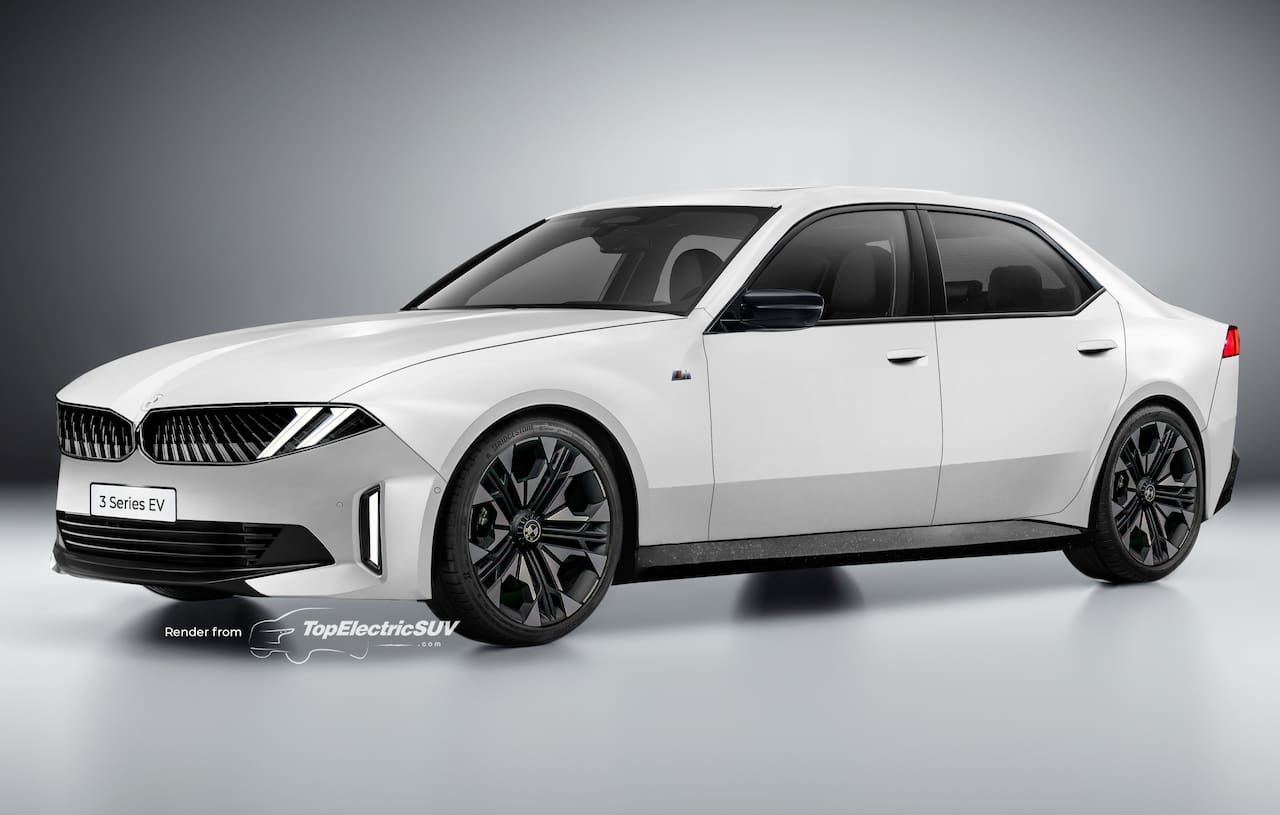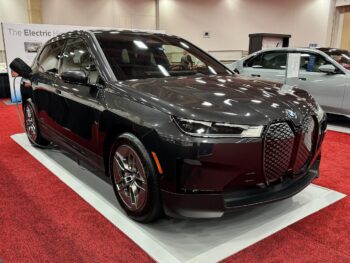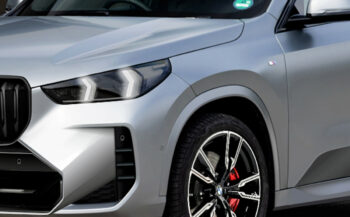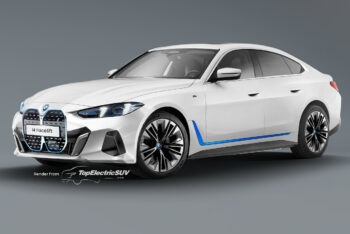Update: ‘BMW 3 Series sales in the U.S.’ section updated, and other sections revised to bring it up to date.
In March 2021, BMW Group introduced the BMW i3 sedan exclusively for the Chinese market. Following this launch, the company began developing a global BMW 3 Series Electric. The new model aims to compete with the widely popular Tesla Model 3, which has become the go-to sedan for early EV enthusiasts worldwide.
To keep up with the highly competitive nature of the segment, the 3 Series EV will have to offer plenty of novelty. With its new platform, design language, powertrain, in-cabin technology, and more, it’s equipped to challenge the growing list of electric sedans. Here’s what we know about the BMW 3 Series Electric:
X3 & 3 Series to gain new EV versions
On August 3, 2022, during a conference call to discuss BMW Group’s H1 2022 results, Oliver Zipse, the company’s CEO, indicated that the first Neue Klasse EVs will be the next-gen BMW iX3 and the global BMW 3 Series Electric.
For the launch of the Neue Klasse, we are planning a compact sedan in the 3 Series segment and a sporty SUV.
Oliver Zipse, CEO, BMW Group (BMW Group H1 2022 results conference call on August 3, 2022)
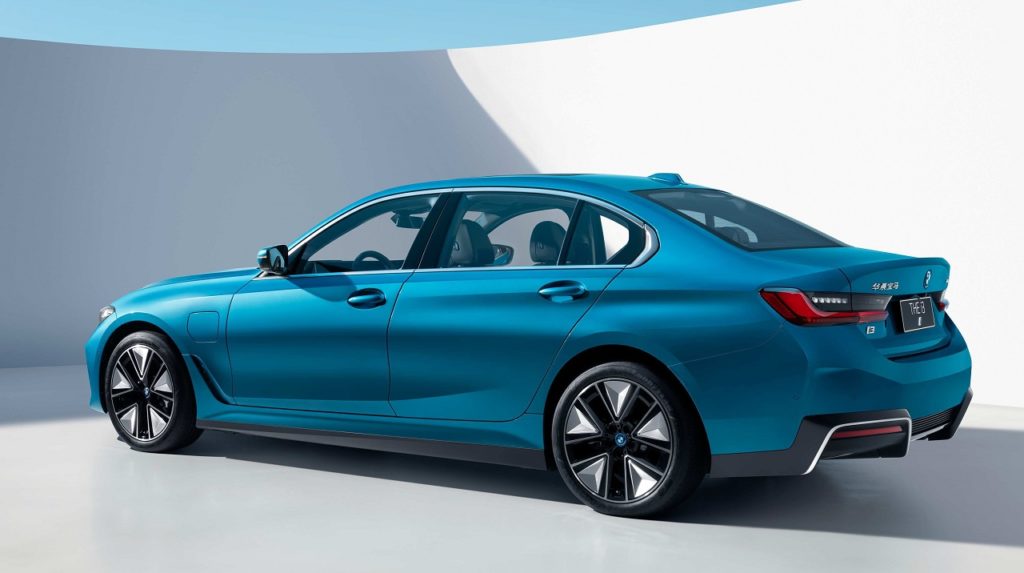
Neue Klasse to focus on the 3 Series segment
During the Q1 2022 earnings call, Zipse stated that the Neue Klasse would focus on premium mid-size cars. He mentioned that the Neue Klasse would not extend from lower segments to luxury segments.
Initially, reports indicated the Neue Klasse would be “BEV first,” meaning that in addition to BEVs, it was thought to support gasoline, diesel, and plug-in hybrid cars. However, BMW Group has since clarified that the Neue Klasse will exclusively be an electric car platform. Developed at the BMW Group Forschungs- und Innovationszentrum (FIZ) in Munich, Germany, this platform marks the third phase of the company’s electrification strategy.
Fresh nomenclature
British magazine CAR has reported that starting with the next-generation X3 and 3 Series, BMW will adopt a fresh naming system. According to the publication, standard 3 Series models will be named 330 and 340, while the electric variants will bear the names BMW i330 & BMW i340. It’s assumed that the i340 will be the dual-motor variant in the regular lineup. This change would help BMW incorporate EVs more seamlessly into its existing lineup and make it clearer for buyers to understand the different variants in each nameplate, which otherwise could sound like a word puzzle.
Design & Build
According to Bimmerpost member ynguldyn, BMW Group intends to release the global 3 Series electric in both sedan and Touring (wagon) versions, under the codename BMW NA1. Despite the dominance of electric SUVs, it looks like the German automaker sees wagons as still holding potential.
Clean design
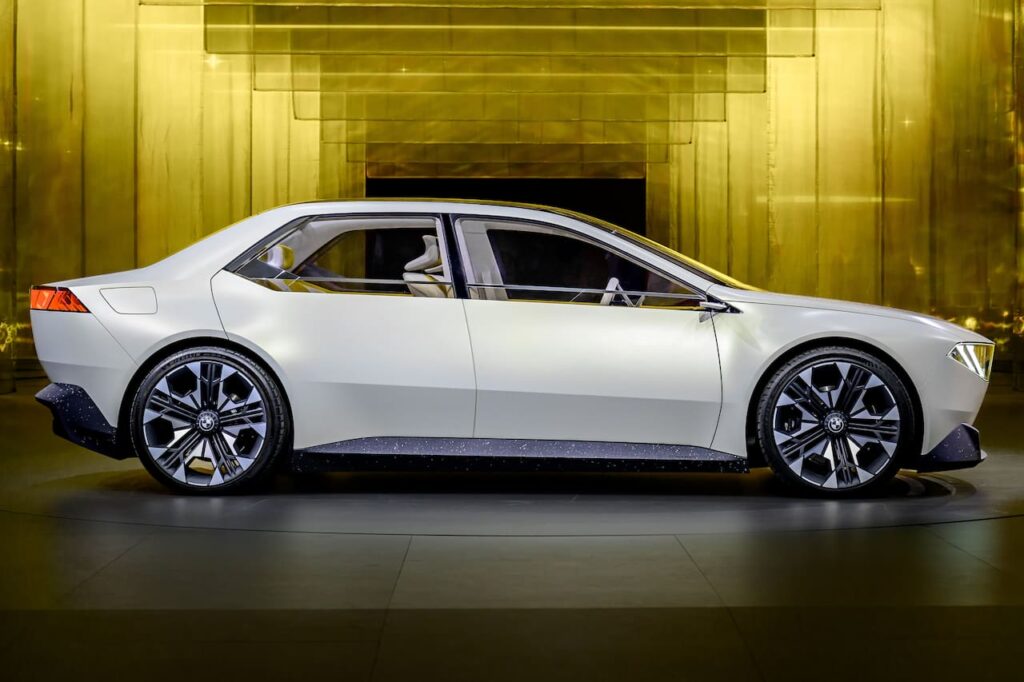
Adrian van Hooydonk, Senior Vice President – Design, BMW Group, has said that future BMW designs will be cleaner, as per a report TopGear released on May 25, 2023. Many recent BMWs have drawn criticism from customers and media, including the latest M3 (Sedan & Touring), 4 Series (Coupe, Convertible, and Gran Coupe), M4 (Coupe & Convertible), 7 Series, i7, X7, and the most controversial of the lot – the XM.
BMW Group isn’t ignoring feedback from the public, but it has to keep trying new things, van Hooydonk explained. The company isn’t “throwing things out there to see what sticks,” he said, emphasizing the designers have a clear direction internally. The grille, which is currently the most debated topic, will be according to the proportion of the overall vehicle or according to the kind of expression the company wants it to have, the design boss added.
Different look from the regular 3 Series
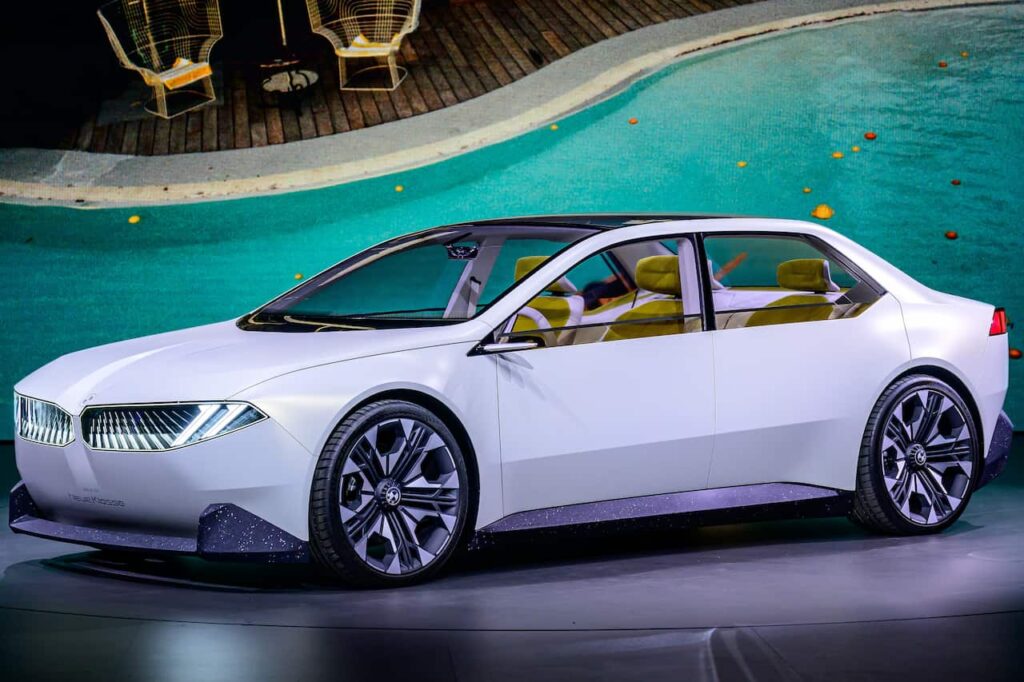
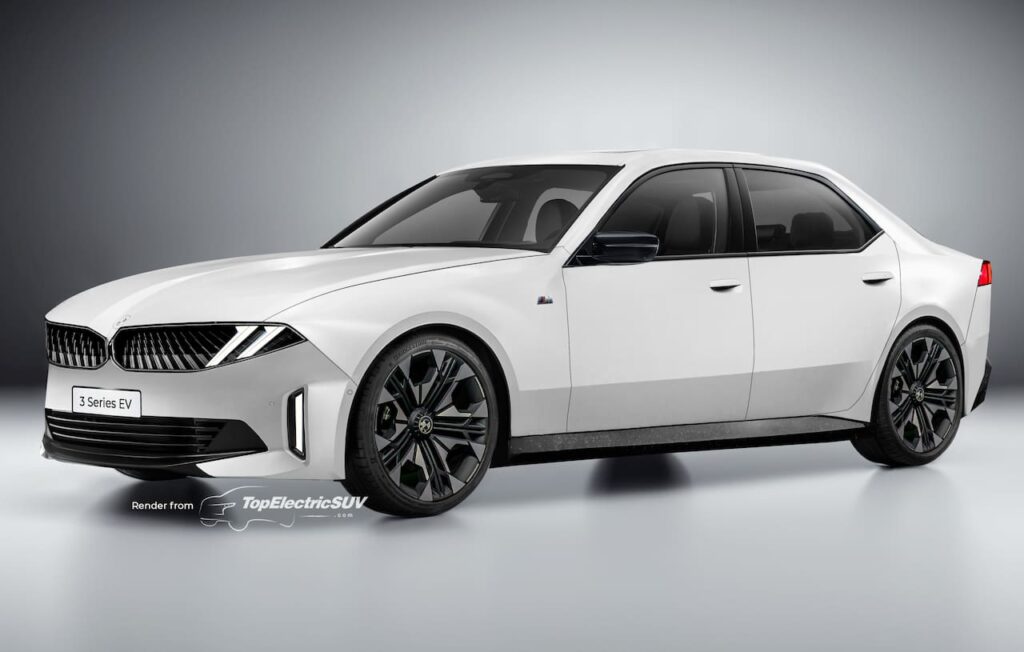
The BMW 3 Series Electric will distinguish itself from internal combustion engine models with its dedicated EV platform. It will be sleeker, more technologically advanced, and more practical. We expect it to feature a longer wheelbase and more raked A-pillars, giving it a distinctive stance.
Serving as an indirect preview, the BMW Vision Neue Klasse evolves from the BMW i Vision Dee, hinting at the first Neue Klasse car’s design. The production car is expected to feature a ‘shark nose’ front-end, representing a futuristic take on the iconic BMW kidney grille and double headlights. Similarly, an almost monolithic body, with strong indentations at the front and rear, powerful wheel arches, and expansive window areas, should feature among the exterior highlights.
Our rendering (above) offers a glimpse of what the global BMW 3 Series Electric could potentially look like. We’ve adapted the front bumper for production, incorporated fog lamps, streamlined the greenhouse, and added sleek door handles. The actual production model may look different from our rendering, and we’ll know that for sure once prototypes hit the road.
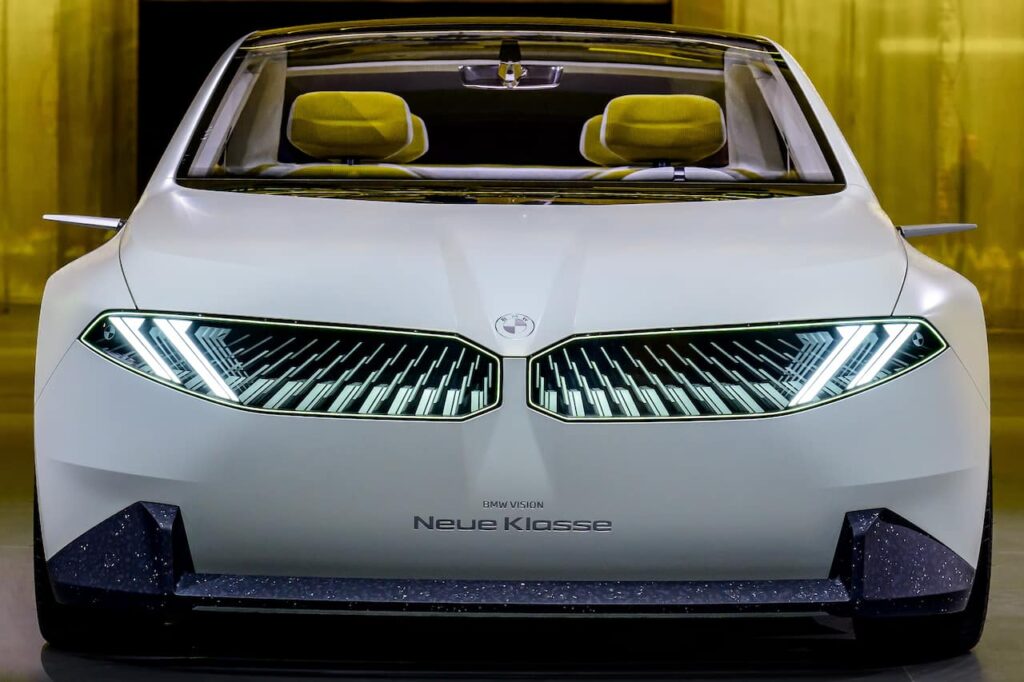
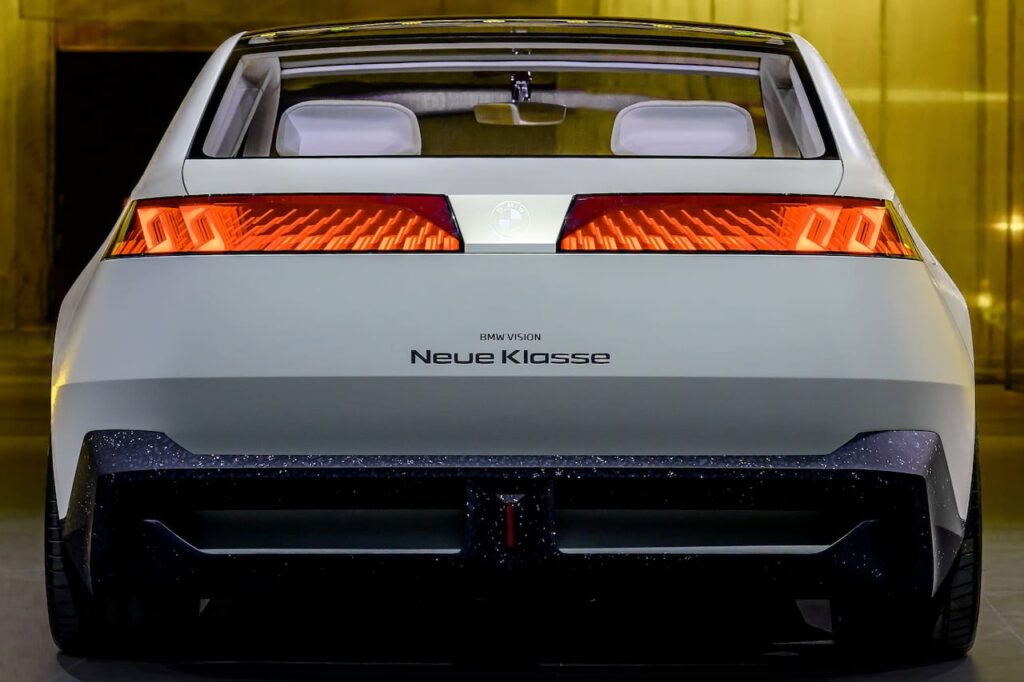
Combined grille
The global 3 Series electric could be the first production BMW with a kidney grille reinterpreted as a digital surface extending across the width, clubbing the headlights and grille. Similarly, the Hofmeister kink could be replaced by what BMW terms a ‘phygital icon,’ following the transformation of the kidney grille and twin circular headlights into new design signatures. At the rear, Dukec said that BMW will now “always” use twin rear lights, as opposed to the current L-shaped rear lights.
We believe that the strongest icon of the BMW was always this twin headlight and now we put it just on the back.
Domagoj Dukec, Head of BMW Design, BMW Group (Interview with BMW Blog at CES 2023)
Less add-on parts
As part of its sustainability measures, BMW is finding new ways to lower the use of resources, and one of them is reducing add-on parts. The global 3 Series EV is expected to feature engraved BMW logos and laser-etched model badges. Furthermore, it might not come with add-on styling parts like a rear diffuser or side skirts either. BMW may restrict such elements to configurations (or models) that absolutely can’t do without them, like a potential i3 M, for instance. That’s what Dukec suggested while talking about the BMW i Vision Dee:
There are no black trim areas because it doesn’t need that. The car itself has a perfect stance and so it feels sporty but without trying too hard and this is somehow what we did in the past, yeah? In (E)30, didn’t have a lot. It had just nice wheels and that’s it, and somehow we believe that we can go back there.
Domagoj Dukec, Head of BMW Design, BMW Group (Interview with BMW Blog at CES 2023)
Multi-material approach
To keep the weight of the 3 Series Electric’s bodyshell in check, BMW Group could rely on its multi-material formula. By incorporating aluminum, steel, and carbon-fiber-reinforced plastic in its design, the car’s energy consumption could be significantly reduced.
Interior
The interior of the global BMW 3 Series Electric could be visibly more futuristic than current BMWs, with the iX bespoke EV no exception. Like in the BMW Vision Neue Klasse (pictured below), the dashboard could be a sleek panel that harmoniously blends with the curvy doors, wrapping around the front occupants and giving them a sense of security.
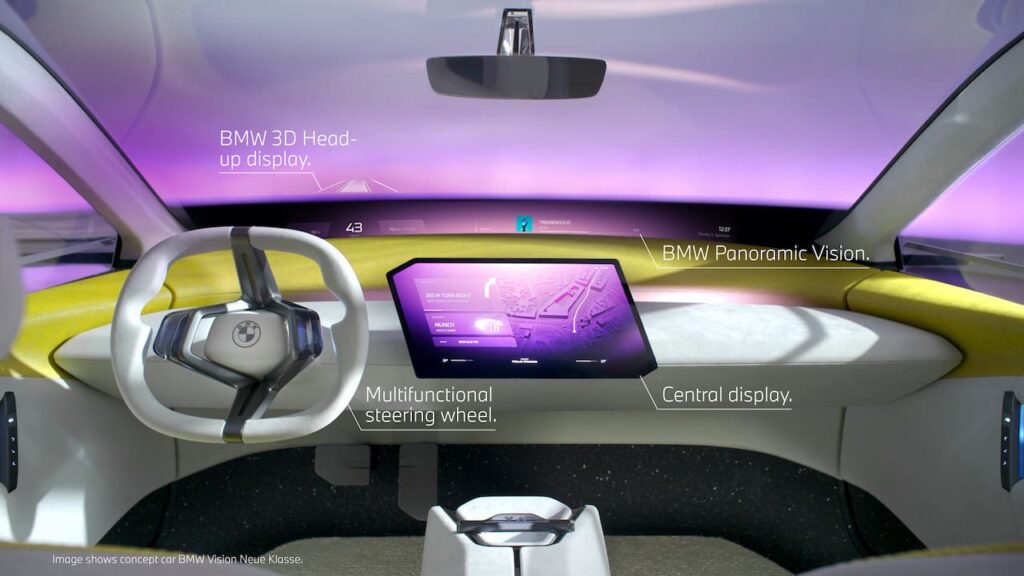
Panoramic Vision
The dashboard is expected to feature a squircle steering wheel alongside a large, tablet-like horizontal central display equipped with matrix backlight technology. Instead of an instrument cluster, a curved digital display called ‘BMW Panoramic Vision’ placed further ahead and covering the entire width of the windscreen would show the driver the essential driving information.
BMW Panoramic Vision projects information with a higher light intensity and contrast onto a dark-tinted area at the bottom of the windscreen, which results in a sharp image that’s easy to read. It reduces distraction during driving and thus improves safety.
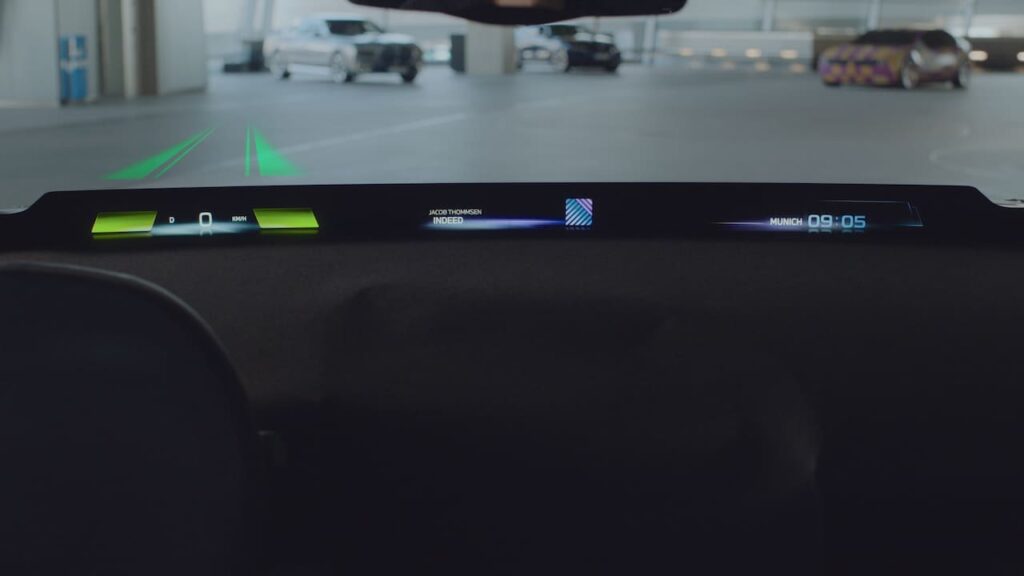
The driver and front passenger would be able to move content, possibly including driving directions, from the central display to the BMW Panoramic Vision. In a press release detailing the concept version (first shown in the BMW i Vision Dee and then in the Vision Neue Klasse), BMW mentioned it as a standard feature for all Neue Klasse models.
3D HUD
A new BMW 3D Head-Up Display would also be present in the car, projecting information, limited to the essentials, further ahead into the driver’s line of sight. The steering wheel will likely have new buttons with active haptic feedback.
Recycled materials
A high proportion of recycled materials are expected to be used in upcoming BMW electric cars. The BMW i Vision Circular concept gives us an idea of what may be available in the future. For instance, the upholstery would have a velvet-like texture and feel but is made using recycled plastic. Also, expect future BMW electric cars to have a greater harmony between exterior and interior designs. The i Vision Circular uses bronze metal accents in the exterior and interior for greater design uniformity.
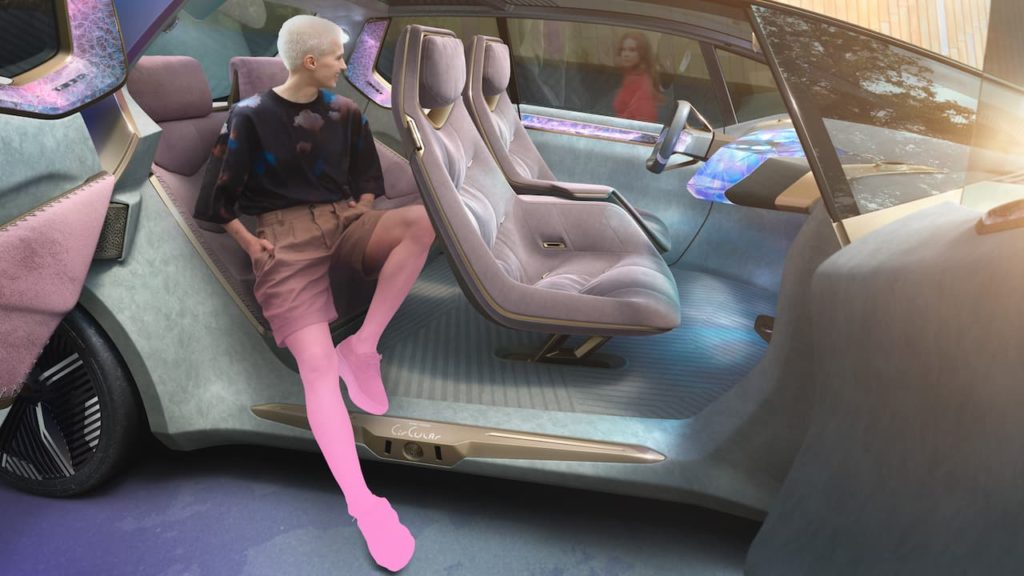
Flat floor & frunk
The floor will be flat in the cabin, with no center tunnel obstructing the space. This could result in a flexible cabin (for luggage and passengers) and a clean design. Buyers can also expect a ‘frunk,’ or storage space where the engine would typically be. The use of recycled and sustainably sourced eco-friendly materials should be significant, contributing to the company’s carbon-neutral goals.
BMW 3 Series Electric Specifications
Layout
BMW is pouring resources into the development of Neue Klasse which would enable the brand to focus on volume production and streamline processes to reduce manufacturing and delivery times. NK would also support multiple drivetrain layouts, including FWD, RWD, and AWD. What’s more, NK can also allow multiple ride heights and support various wheel sizes, ranging between 18- and 22-inches. With this level of flexibility, the future 3 Series variants could be designed for cruising, performance, and even all-road capability.
Cells & battery packs
Officially, we know that Neue Klasse EVs will feature BMW Group’s sixth-gen battery cells that will offer an improvement of more than 20% in energy density and up to 30% in range and charging speed. These will be round or cylindrical cells with a standard 46-mm diameter and two different heights – 95 mm and 120 mm. The 3 Series electric should get the smaller version.
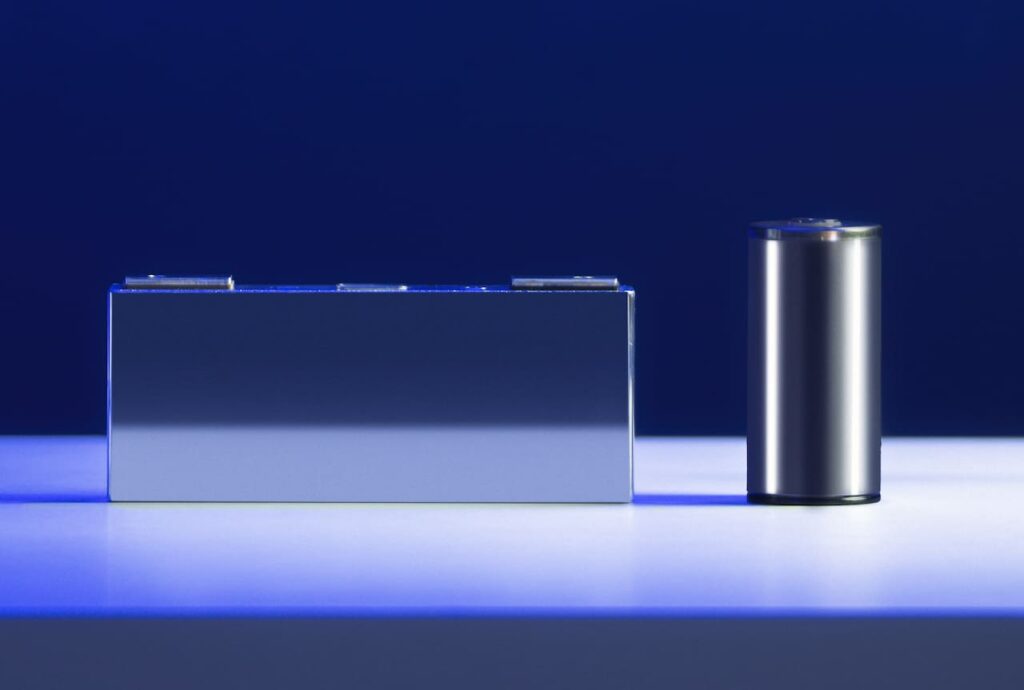
On the cathode side, nickel content will be higher, while the cobalt content will be lower. On the anode side, the silicon content will be higher. It will be possible to use cathodes made of lithium iron phosphate, which could be relevant to the next-gen i3 offered in China and maybe even European markets.
Frank Weber, BoM member responsible for Development, BMW Group, shared more Neue Klasse EV details at the Nachhaltigkeit durch Innovation (Sustainability through Innovation) event, which took place in Munich on September 5, 2022. He said that the company won’t go big on cell power and extreme range, as that would be counter-productive to reducing energy consumption, as per a report CAR published on November 4, 2022.
BMW Group will offer 75-150 kWh battery pack options in the Neue Klasse EVs, but the 3 Series Electric may get 75-80 kWh units for a balance of range and weight.
Cell Contacting system
BMW Group has opted for Molex’s Volfinity Cell Contacting System (CCS) for its next-gen EVs. Volfinity offers a dependable interface solution that seamlessly connects cells to the control board within an electric vehicle battery module. The technology eliminates the requirement for wire connections.
Range & charging
Speaking to journalists at CES 2023, Zipse suggested Neue Klasse EVs will beat their direct competitors in the core aspects. “We will be the benchmark in terms of range, charging speed, and pricing,” he said, Automotive News Europe reported on January 12, 2023. Currently, the Tesla Model 3 is the benchmark in the segment, with an EPA-est. range of 341 miles and a peak charging power of 250 kW (175 miles in 15 minutes).
Neue Klasse EVs will be able to take advantage of Electrify America’s 800-volt charging stations. They will be able to add 30 miles of range per minute up to a maximum of 375 miles, Weber said, as per the CAR report dated November 4, 2022. Fast-charging from 0 to 95% will take just about 12 minutes.
BMW M3 electric successor
A BMW M3 electric successor is in the pipeline, Autocar reported on August 15, 2022. BMW M CEO Frank van Meel has told the British publication that if the M3 goes electric, and maybe it will, it will still be an M3.
BMW M is gathering feedback from customers about its potential switch to EVs. So far, the company has learned that 90-95% of its customers are not concerned about the propulsion system as long as it’s a proper BMW M.
Manufacturing
Production of the global BMW 3 Series EV will commence at the upcoming BMW Group Plant in Debrecen, Hungary, starting in 2025. The BMW Group Plant in Munich, Germany, will start manufacturing the EV in 2026. According to BimmerPost forum member ynguldyn, German production at the Munich factory, where the current 3 Series is made, will begin in November 2026.
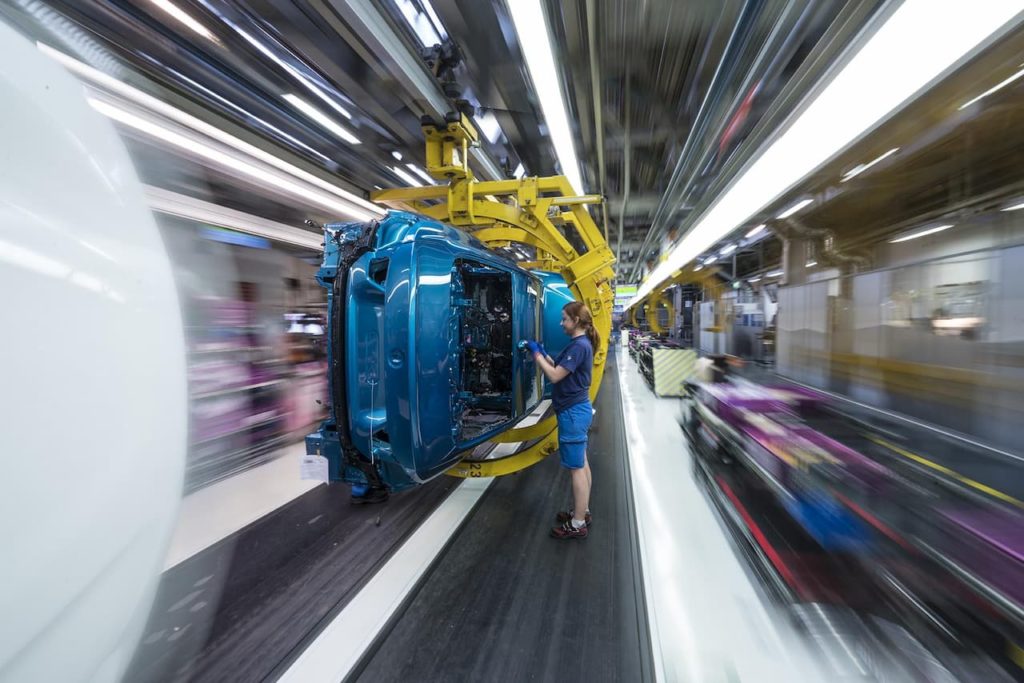
The Mexican factory, which is also reportedly getting production allocation, will start rolling out the next-gen BMW 3 Series Electric a year later (in 2027). It started making cars in 2019 beginning with the seventh-gen 3 Series, and since 2021, builds the second-gen BMW 2 Series Coupe as well. The second-gen BMW M2 joined these models in December 2022.
Electric drive units
BMW Group is likely to employ the new e-drive units manufactured in Steyr, Austria, in the 3 Series Electric. The company has confirmed that it plans to use sixth-gen e-drives in its Neue Klasse models and manufacture the same at the BMW Group Plant Steyr. In an announcement on June 20, 2022, it said that the Austrian factory will build the next-gen e-drives starting in 2025. Steyr will produce more than 600,000 e-drives annually. In the future, the Austrian engine plant will make all the key components for the e-drive, including rotor, stator, transmission, inverter, and housing.
Batteries
The batteries of the new 3 Series Electric will likely come from Debrecen, where the company plans to build a high-voltage battery assembly unit on the site of the future vehicle plant. It will assemble the sixth-gen round battery cells into a battery house – a metal frame, which it will later integrate into the underbody of its EVs. Assembly of the batteries will begin in 2025. As for the sixth-gen round battery cells, they may ship from one of the two European cell factories (CATL or Eve Energy) that the BMW Group announced on September 9, 2022, each of which will have a total annual capacity of up to 20 GWh.
Release Date
The global BMW 3 Series Electric will likely go on sale in Europe in late 2025 and start reaching U.S. dealerships a few months later, by early 2026.
The next-gen electric sedan will enter a highly competitive space—Xpeng launched its entry-level sedan P5 in 2021, Nio released the Nio ET5 in September 2022, Mercedes-Benz plans to introduce the C-Class Electric by mid-decade, and Ingolstadt is also planning a future Audi A4 Electric. And did we mention the evolved Tesla Model 3?
Gas-powered BMW 3 Series will continue
As part of BMW’s commitment to providing customers with the Power of Choice, a thermal-engined 3 Series will remain in dealer showrooms for years to come. After all, the 3 Series is the bread and butter for BMW.
BimmerPost forum member ynguldyn says that an eighth-gen BMW 3 Series is in the pipeline. It will consist of sedan and wagon versions, codenamed ‘BMW G50’ and ‘BMW G51.’ It will enter production in July 2027, which means customers should be able to get the standard 3 Series well into the next decade.
Electric vehicles are unlikely to be democratized by the middle of the decade in many regions where BMW has built a market share. In an interview with auto motor und sport in January 2022, Frank Weber (BoM member responsible for Development at BMW AG) shared that even in 2025, customers may not be able to drive an electric car freely due to infrastructure limitations. The progress isn’t as fast as some may have imagined.
The brand “will not force” customers to choose between new (electric models) and “old” (ICE models), according to Weber. EV adoption has already gained momentum in China, Western European markets, the United States, and Canada, but ICE models will continue to dominate sales in many markets like Southeast Asia and South America, among others, throughout this decade.
BMW 3 Series sales in the U.S.
In 2023, sales of the 3 Series in the U.S. saw an 11.8% increase, reaching 33,997 units, up from 30,400 in 2022. However, the model’s popularity has declined from previous years. In 2021, it had recorded 49,461 units in annual sales. For 2020 and 2019, the annual sales figures were 41,442 and 51,848 units, respectively. Introducing an all-electric variant to the American 3 Series lineup would undoubtedly lead to a significant impact on the company’s sales, as it could present buyers in the luxury segment with a compelling alternative to the Tesla Model 3.
TopElectricSUV says
It is likely that the next-generation BMW 3 Series electric will be one of the best EVs from the Munich, with a great balance between performance, efficiency, and range, thanks to the Neue Klasse architecture. A notch above the Tesla Model 3 in terms of quality and comfort is to be expected. When it hits dealers in 2026, it could be the most affordable BMW EV offered in the U.S., where the iX1 isn’t available.
BMW 3 Series Electric FAQs
What will be the BMW 3 Series Electric price?
The BMW 3 Series Electric price might start at USD 50,000 (MSRP).
What is BMW 3 Series Electric release date?
We should see the global BMW 3 Series Electric debut in 2025. The U.S. launch is expected in H1 2026.
What are BMW 3 Series Electric rivals?
The 3 Series Electric’s competitors would be the Tesla Model 3, Mercedes C-Class Electric, and Audi E4 (A4 e-tron).
Featured Image Source: TopElectricSUV’s rendering
An automobile engineer by training, I’ve analyzed the global car market since 2005, with a keen focus on EVs since 2008. My journey in online automotive publishing spans 16 years, during which I have reviewed cutting-edge automotive technologies and interviewed leading CEOs and vehicle developers from around the world.
